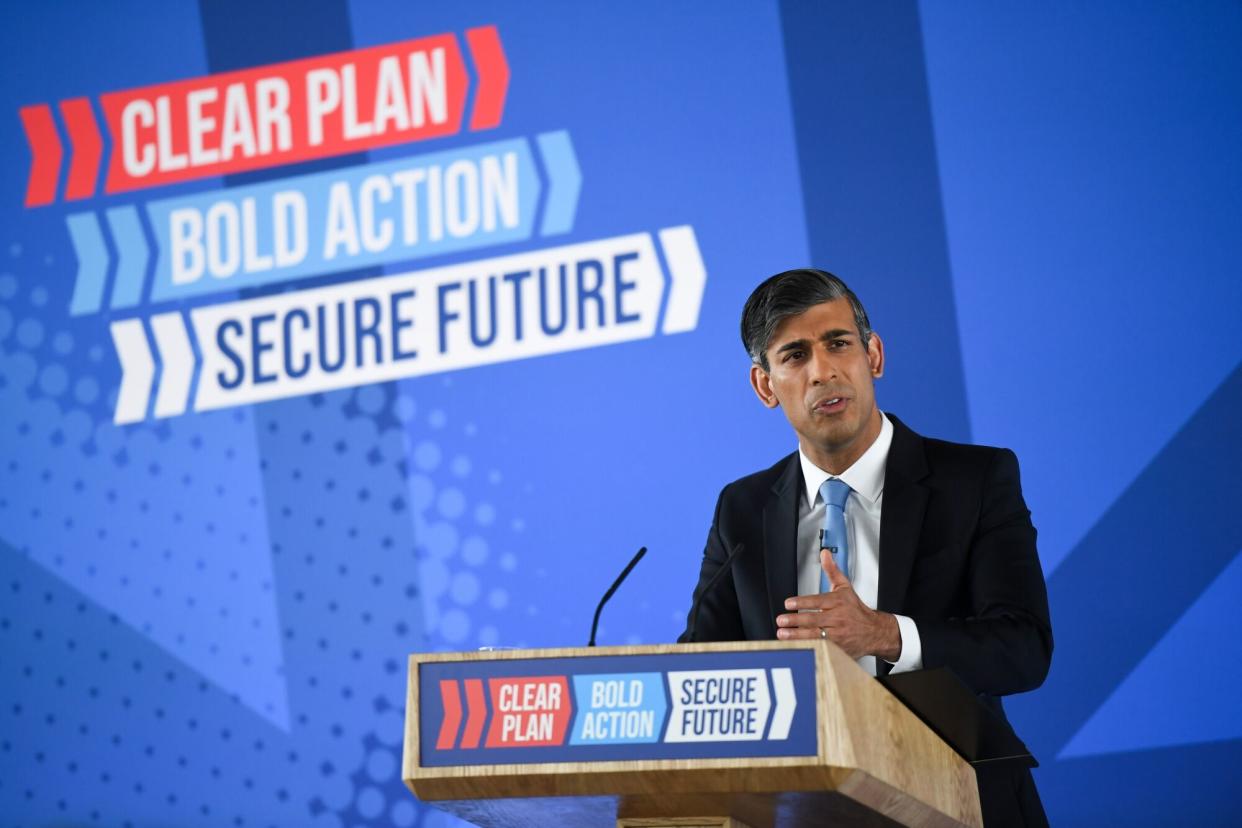Latest Polls Say UK Conservatives Head for Election Wipeout

(Bloomberg) -- UK Prime Minister Rishi Sunak’s Conservative Party is headed for a historic wipeout in the July 4 general election, according to three new polls published in Sunday newspapers.
Most Read from Bloomberg
Flesh-Eating Bacteria That Can Kill in Two Days Spreads in Japan
How the US Mopped Up a Third of Global Capital Flows Since Covid
These Are the World’s Most Expensive Cities for Expats in 2024
S&P 500 Set for Fresh Highs Amid Rally in Big Tech: Markets Wrap
An MRP poll by Survation published in the Times predicts the Labour opposition will win a 262-seat majority in Parliament, with the Conservatives cut to just 72 seats. Opinium’s survey for the Observer showed Labour with a 17-point lead, and Savanta predicted “electoral extinction” for Sunak’s party in a poll for the Sunday Telegraph.
The figures illustrate how Sunak’s weak position going into the campaign has deteriorated since he called the surprise vote three weeks ago. They suggest the Conservatives headed for their worst defeat since the party was formed two centuries ago, with fewer than half the seats they had after a rout in 1906.
“Our research suggests that this election could be nothing short of electoral extinction for the Conservative Party,” said Chris Hopkins, political research director at Savanta.
Conservatives have started to warn about the risks of handing Labour such a commanding majority. Former Cabinet minister Robert Jenrick told the Telegraph that the UK may end up as an “elective dictatorship that will be equally unrestrained on raising taxes.”
Labour, for their part, are warning voters not to be complacent about the polls.
“This election is not settled yet,” Shadow Health Secretary Wes Streeting told Sky News on Sunday. “I do not want people to wake up to a nightmare on Downing Street on the fifth of July.”
The Independent said voters’ trust in the Conservatives on tax issues has collapsed. A survey by Techne UK for the newspaper found 36% trust Labour leader Keir Starmer on tax compared with 16% for Sunak.
In an interview with the Sunday Times, Sunak acknowleged the economic backdrop is a challenge for the Conservatives but that the nation has turned a corner.
“We have had a tough time,” Sunak told the Times in an interview published Sunday. “That’s not someone’s fault that we had a pandemic and then a war in Ukraine, and that is a big source of the frustration and insecurity that people feel and all the damage that it’s done to our living standards over the past few years.”
“But I really think that after a lot of hard work and resilience from everybody, we’ve got through the worst of that and we’ve turned a corner. The economy is growing faster than all our major competitors. Inflation is back to normal, wages are rising, energy bills are falling, so people can, I hope, start to feel more confident about the future.”
Survation’s MRP work used 42,000 interviews from May 31 to June 13 and was the most detailed. It showed:
Labour could take 443 seats in Parliament, compared to 83 for the Conservatives
Liberal Democrat are on track for 53 seats.
The right-wing Reform party has a “possibility” of gaining 12 seats, including a narrow win for its leader Nigel Farage.
Savanta’s research suggested Labour has a 25-point lead, the biggest since Liz Truss’ brief term as prime minister in 2022. It had Labour on 46% of the vote, the Conservatives with 21% and Reform at 13%. Liberal Democrats were in fourth place with 11%. That survey of 2,045 adults was done June 12-14.
“There’s a real sense that things could still get worse for the Conservatives,” Hopkins said, “Time is already close to running out for Rishi Sunak.”
Opinium said the two main parties are on track for their lowest share of the vote since 1945, with voters drifting to other groups like Reform and the Liberal Democrats.
It found smaller parties had gained ground during the campaign. That bucked the pattern seen in 2019 where voters increasingly opted for the main parties as the campaign went on.
--With assistance from Charlotte Hughes-Morgan.
(Updates with Streeting remarks in seventh paragraph.)
Most Read from Bloomberg Businessweek
Google DeepMind Shifts From Research Lab to AI Product Factory
Trump’s Planned Tariffs Would Tax US Households, Economists Warn
Grieving Families Blame Panera’s Charged Lemonade for Leaving a Deadly Legacy
It Will Take More Than US Bargaining Power to Cut Drug Costs
©2024 Bloomberg L.P.

 Yahoo News
Yahoo News 

